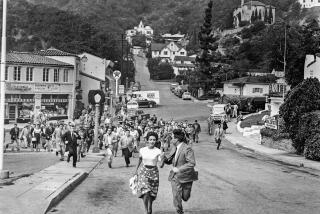Writer co-founded society of film critics
- Share via
Hollis Alpert, a film critic and author who co-founded the National Society of Film Critics more than 40 years ago in the living room of his New York City apartment, has died. He was 91.
Alpert died of pneumonia and respiratory failure Nov. 18 at Naples Community Hospital in Naples, Fla., said Lacey King, a friend.
The society was started in 1966 after Alpert -- then a critic for the weekly Saturday Review magazine -- and other reviewers were denied membership in the New York Film Critics Circle, which then favored critics who worked for newspapers.
Influential critic Pauline Kael, who would later work for the New Yorker, also played a key role in starting the group, said Richard Schickel, a founding member who was then Life magazine’s movie critic.
“At the time, there was an enormous stir and fervor about the movies. . . . There was a little shaking of the foundations, and we were kind of at the forefront of that. It was fun,” Schickel, who now writes reviews for Time magazine, told The Times on Monday.
Though the first members were all New Yorkers, they called their group a national society because they wrote for publications with national reach. Today, the group’s 60 members also include critics for major daily and weekly newspapers.
Joe Morgenstern, who was Newsweek’s film critic at the time of the society’s founding, recalled that one reason he helped establish the group was to counteract Bosley Crowther, the New York Times movie critic “who was the really dominating influence on the New York film scene. And it was a deadening influence.”
The lesser-known Alpert “was widely seen as a serious, knowledgeable, dedicated film critic. The Saturday Review . . . was a considerable presence on the scene then, when movie reviews mattered and were taken seriously as an intellectual matter,” said Morgenstern, who is now the Wall Street Journal’s film critic.
The world of entertainment also permeated Alpert’s many fiction and nonfiction books.
He captured the controversial history of “The Life and Times of Porgy and Bess” (1990) in “crisp, engaging prose,” according to a 1991 Baltimore Evening Sun review. In another book, “Broadway!: 125 Years of Musical Theatre” (1991), he presented a concise history of the American musical.
Among the biographies he wrote were “The Barrymores” (1964), about the illustrious acting family that can trace its American roots to patriarch Maurice Barrymore’s Broadway debut in 1875, and “Fellini: A Life” (1986) about the Italian film director. He also co-wrote autobiographies with actors Richard Burton and Charlton Heston.
Alpert fictionalized Hollywood filmmaking in the mid-1960s novel “For Immediate Release” and the 1973 novel “Smash,” two books that demonstrated his ability to write readable fiction, according to Los Angeles Times reviews.
Film critic and historian Leonard Maltin told The Times in an e-mail that Alpert “was an erudite man at a time when that was a virtue, not a liability, in the world of journalism and film criticism.”
Born Sept. 24, 1916, in Herkimer, N.Y., Alpert was the son of Abram and Myra Alpert. His father left the family before Alpert reached adolescence, and his mother ran a girdle and bra factory.
During World War II, he served in the Army as a combat historian, writing lengthy accounts of war battles while sending home short stories that were published in magazines. After the war, Alpert returned to New York City and worked as assistant fiction editor at the New Yorker from 1950 to 1956. He continued to write freelance book and film reviews for other publications, which led to his being named movie critic for the Saturday Review.
In 1975, Alpert left his reviewing post and served as editor of American Film Magazine for six years.
The twice-divorced Alpert had no children. His third marriage to Joan O’Leary lasted from 1960 until her death in 1990. Several years later, he moved to Florida and taught writing and lectured on film at a local arts center.
“He was such an intellectual,” his friend King said. “People clamored to be in his company.”
Alpert is survived by his sister, Anita Olkin, of Ewing, N.J.
--
More to Read
Only good movies
Get the Indie Focus newsletter, Mark Olsen's weekly guide to the world of cinema.
You may occasionally receive promotional content from the Los Angeles Times.











